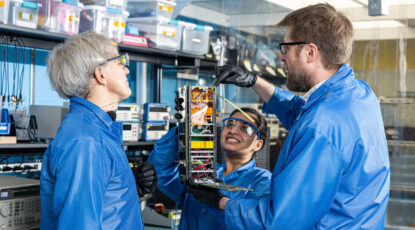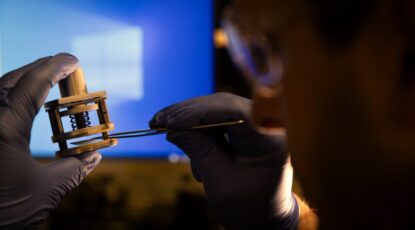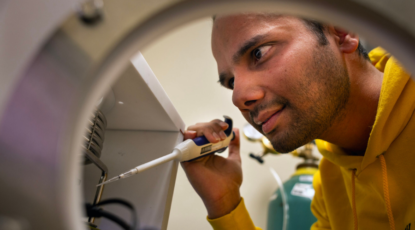Innovation
-
U-M astronomy will lead its first satellite mission
The project assembles a team of experts from across the country for a mission called STARI — STarlight Acquisition and Reflection toward Interferometry. The goal is to showcase the viability of a new technique for studying exoplanets, or planets outside of our solar system.
-
Not so simple machines: Cracking the code for materials that can learn
It’s easy to think that machine learning is a completely digital phenomenon, made possible by computers and algorithms that can mimic brain-like behaviors. But the first machines were analog and now, a small but growing body of research is showing that mechanical systems are capable of learning, too, say physicists at U-M.
-
‘Unprecedented’ level of control allows person without use of limbs to operate virtual quadcopter
A brain-computer interface, surgically placed in a research participant with paralysis in all four limbs, provided him an unprecedented level of control over a virtual quadcopter — just by thinking about moving his unresponsive fingers. Such groundbreaking technology could impact one’s ability to socialize, work, and enjoy recreational activities.
-
New water purification technology helps turn seawater into drinking water without tons of chemicals
Cutting acid and base treatments from conventional desalination plants could save billions of dollars globally, making seawater a more affordable option for drinking water, say experts at U-M. A study describing the new technology has been published in Nature Water by engineers at Michigan and Rice University.
-
U-M closes on purchase of nearly 2.3 acres in Detroit
In December 2024, U-M closed on a $9.5 million purchase of land at 2201 W. Grand River Ave. from MGM Grand Detroit that is expected to support the future needs of the U-M Center for Innovation. Part of the nearly 2.3-acre parcel, strategically located across the street from the UMCI, will be used for a parking structure.
-
University to begin installing solar power sites on campus
New solar installations distributed across the Ann Arbor, Flint and Dearborn campuses will have a total capacity of 25 megawatts of renewable electricity after a three-year installation process is complete. The electricity generated — enough to power about 3,000 homes — will feed directly into U-M buildings rather than going back into the regional power grid.
-
U-M, Los Alamos National Laboratory to jointly develop Michigan-based AI research center
The effort builds on a recently established research collaboration between the two institutions. A facility in Washtenaw County will house one computing center to support Los Alamos scientists and engineers focused on national security AI challenges. An adjacent academic computing center will align U-M faculty and students with Los Alamos researchers.
-
In 10 seconds, AI model detects cancerous brain tumor often missed during surgery
The technology works faster and more accurately than current standard of care methods for tumor detection and could be generalized to other pediatric and adult brain tumor diagnoses. U-M neurosurgeons believe it could serve as a foundational model for guiding brain tumor surgery going forward.
-
U-M tops $2B milestone in annual research volume
The University reported a record $2.04 billion in research volume during fiscal year 2024, marking the first time its annual research expenditures have exceeded the $2 billion mark.










